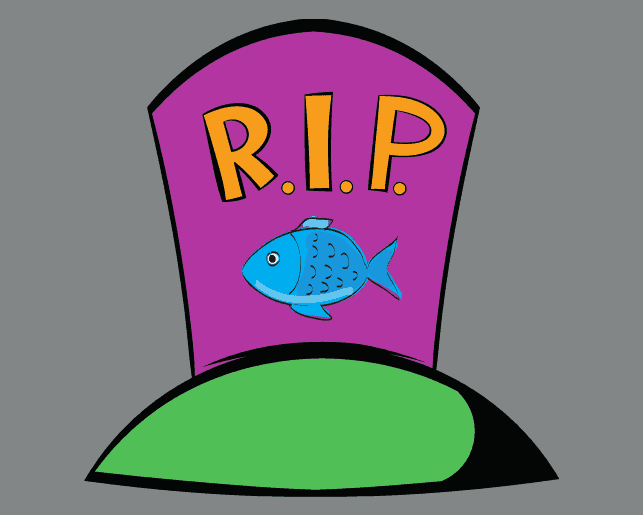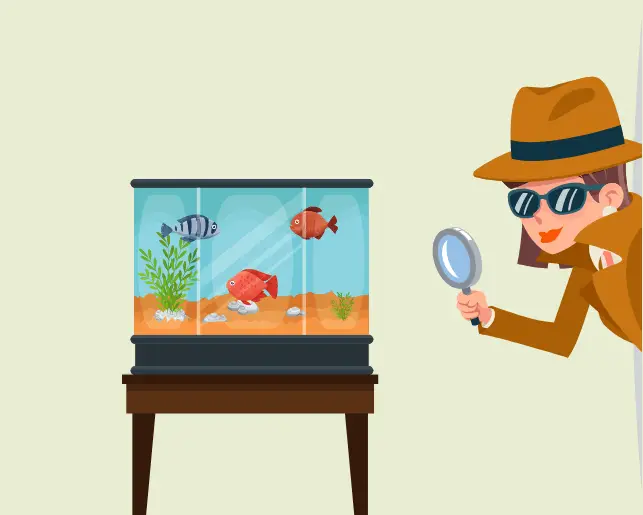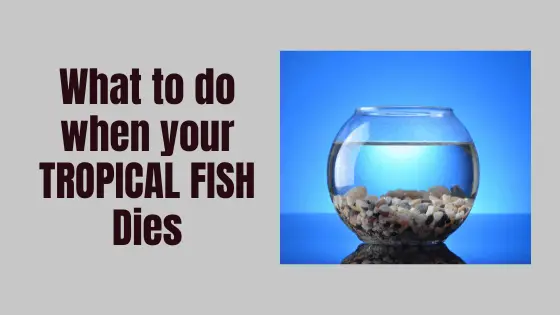The responsibility of caring for your fish can be daunting, especially when you have quite a few in your tank.
It’s always a sad day when one of them dies, but how do you know what to do after? In this blog post we’ll talk about what to do about a tropical fish death.

Main Reasons Why Fish Can Die.
If you have found a deceased fish in your tank, it could have passed away from one of the following reasons:
Stress.
Stress is one of the biggest causes of fish deaths amongst hobbyists. You will probably find that one of the following reasons has led to the fish getting stressed in the first place.
Overcrowding.
This is a very common mistake that beginners can make. It is very tempting to have lots of lovely fish in your tank, but you have to consider how much space they need when they are fully grown, rather than when you first get them.
Overcrowding can lead to a number of problems, including not enough oxygen and bullying by other fish as they all compete for space.
Bullying/Attack.
There are many different species of fish that are known as good community fish, meaning they get along fine with other like minded species.
At the other end of the spectrum are fish that are known for being aggressive to other fish. Some are just aggressive to their own species, while others are aggressive to smaller species.
Before adding any fish to your tank, you need to research who they do and don’t get along with.
Some species, like Barbs, are known for being fin nippers. Now, while this may not kill another fish, it can be extremely stressful for the fish whose fins keep getting nipped.
Water Problems.
Water problems can be due to many different factors.
- Untreated tap water being added
- High Ammonia or Nitrite levels
- incorrect pH level
- Wrong temperature
- Dirty water that isn’t being changed regularly
Disease.
There are many different diseases that can affect topical fish, from bacterial, to parasites to even some forms of cancer.
Some of the most common diseases in fish are:
- Fin Rot
- Ich-also known as White Spot Disease
- Dropsy
- Fungus
- Pop Eye
Many of the diseases fish can suffer with are actually treatable, if you spot the symptoms early enough to be able to take action.
Accident.
Unfortunately this can happen from time to time, and can range from a fish getting trapped somewhere in your tank, to a fish leaping out of the tank when you open the lid to do something.
Overfeeding.
It is very easy to overfeed your fish. A fish’s stomach is the same size as their eye so they only need a small amount.
It can be difficult to calculate how much food to put in if you have quite a few fish in the tank. If the fish all feed for a few minutes and there is still food left over, you have put too much in, so adjust accordingly the next day.
If you overfeed your fish, you can make them bloated, which will then lead to illness.
There is also the issue of uneaten food rotting in the tank and causing an ammonia spike, which can be fatal to your fish.
Starvation.
Some species of fish are known as bottom feeding fish, meaning that they feed at the bottom of the tank.
This is all very well and good, as long as you feed them sinking food pellets for these fish, as well as normal flakes for the other fish in your tank. If you only feed normal flakes, the chances are it will all get eaten by the others before any has a chance to settle at the bottom for the bottom feeders.
Lack of Oxygen.
This is a major problem in an overcrowded tank as too many fish are using too little oxygen.
Even in a properly stocked tank, there are reasons why there could be low oxygen levels-poor filtration, blocked filter, excess waste, excess algae, not enough movement in the water.
Water Change.
It is much better for your fish to carry out regular partial water changes rather than full water changes. A full water change will mess up your water parameters which will effect your fish.
Already Sick.
You may have inadvertently bought a sick fish in the first place.
When choosing your fish, have a good look to make sure they are swimming properly. If at all possible, ask if they can be fed so you can see if they are going to their food ok.
How to Tell if your Fish has Died.
Fish don’t always float to the top of the tank and lie on their backs when they pass away. They can also be found on your substrate, or they could be hidden away somewhere if they have taken themselves off somewhere to die.
The longer they have lay there, the more likely they are to rise to the top of the tank as decomposition starts.
The best way to tell if your fish has passed away is to scoop the fish into your net. If there is no struggle or movement, and the fish seems straight and rigid then they have passed away. You can also look for any signs of breathing by checking their gills for any sort of movement.
You should try and take a quick head count each day (I know that is easier said than done) as it is not always possible to spot a fish that has passed away as it could be well hidden.
What to do when there is a Dead Fish in your Tank.
The first, and most important thing you need to do is remove it from the tank straight away.
A decomposing fish corpse will cause an ammonia spike quite quickly.
Also, fish are greedy buggers and will soon start to eat away at the rotting fish if it isn’t removed. If the fish has passed away due to illness or infection, this is the last thing you want to happen.
Test your water straight away to see if there are any abnormalities. I would also check the water again 24 hours later just to be sure.
If the water is cloudy, carry out a partial water change.
Don’t add any new fish to your tank until you know what the cause of death most likely was and have sorted any issues out.
Double check with an online fish stocking calculator that your tank isn’t overstocked before adding any more in.
Investigating Cause of Death.

Information is power, so knowing what has caused your fish to die will be a massive help in preventing it from happening again.
You need to check the fish’s corpse for any tell-tale signs.
If there is any tearing to the body or fins, this will probably be signs that the fish ahs been bullied or attacked.
Are they bloated or emaciated?
Are there any spots or sores or rashes to the body or fins, as this could be sign of disease or illness.
How to Dispose of a Dead Fish.
While there is no law saying you can’t flush a dead fish down the toilet, I’m sure the water companies aren’t best pleased about it.
There are 2 better ways of disposing of your dead fish.
I wrap mine in a piece of kitchen roll, then place it into a ziplock plastic bag and put it in the outside bin.
You could also bury your fish in the garden, as long as you make sure to dig down deep enough so you don’s have the local animals trying to dig the poor thing up again.
Related Posts:
Can tropical fish drown in their tanks?

